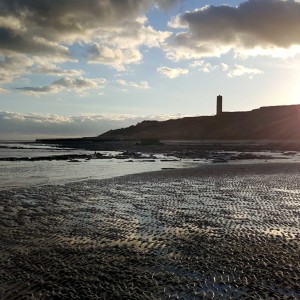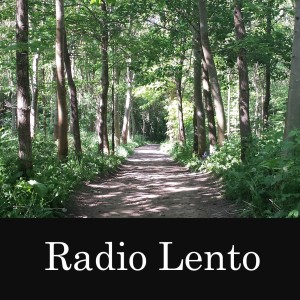
It was last weekend when we made a long train journey out to the North Essex coast, to reach Walton-on-the-Naze. We planned the trip because our maps showed it to be an area out on a limb, and free of major roads. Finding good potential locations for making quiet recordings is very much a main mission for us these days. Quiet is a scarce resource. Long periods of quiet, in wide open landscapes, is even rarer. Scarcer, and even more valuable.
Stepping off the train, we could see Felixstowe across the other side of the estuary. As we walked towards the town with a scattering of other just arriveds, our kit bag with the mics sounded noisy. Something inside, perhaps the metal tripod, knocked and rattled. Shifting it about didn't work. On towards the sea. On past the closed off-season shops. And then we realised. It always takes a while for us city dwellers to realise. It's not the bag that's started rattling. It's the quietness of this place!
Arriving at the nature reserve, along the stony coastal path, an information board told of the rocks being of the eocene epoch, of yielding sharks teeth and other fossils. The land around us had mostly emptied of human things. So down onto the sand we strode, wind cuffing in our ears, we headed straight to walk along the bottom of the chalk cliffs.
It was the sound of a fresh water stream-let that caught our attention. Trickling down the weather-beaten and sea-eroded cliff, forming a small clear pool. A pool surrounded by sand, and by chunks of fallen rock. Chalky, forgiving rocks, some brittle, that break apart within the hand. We played with the rocks and turned to listen to the sea. How the cliff wall mirrored the crashing waves, seemed to emphasise its light blue grey tones. A crisp, bright, wide openness, blended with the contented voices of children, searching for fossils, and couples, walking their dogs.
A good place to record. A good place to take this sound photograph of the beachscape, in January, at Walton-on-the-Naze.
More Episodes
 2022-02-12
2022-02-12
 2.2k
2.2k
 2022-01-29
2022-01-29
 2.3k
2.3k
 2022-01-22
2022-01-22
 2.3k
2.3k
 2022-01-08
2022-01-08
 2.0k
2.0k
 2022-01-01
2022-01-01
 2.5k
2.5k
 2021-12-18
2021-12-18
 2.9k
2.9k
 2021-12-04
2021-12-04
 2.0k
2.0k
 2021-11-13
2021-11-13
 4.6k
4.6k
 2021-11-06
2021-11-06
 2.8k
2.8k
 2021-10-30
2021-10-30
 2.4k
2.4k
 2021-10-23
2021-10-23
 3.0k
3.0k
 2021-10-09
2021-10-09
 2.0k
2.0k
Create your
podcast in
minutes
- Full-featured podcast site
- Unlimited storage and bandwidth
- Comprehensive podcast stats
- Distribute to Apple Podcasts, Spotify, and more
- Make money with your podcast
It is Free
- Privacy Policy
- Cookie Policy
- Terms of Use
- Consent Preferences
- Copyright © 2015-2024 Podbean.com






